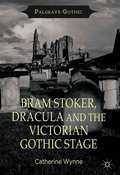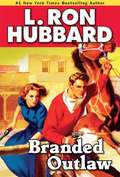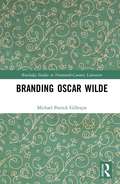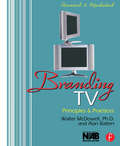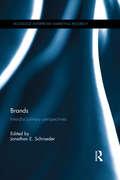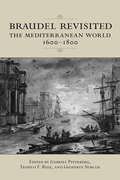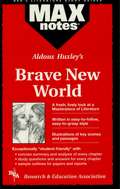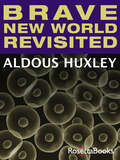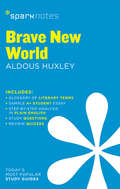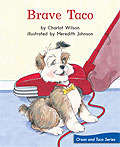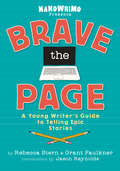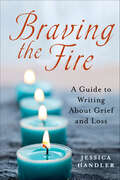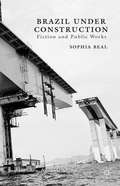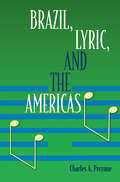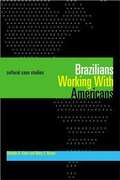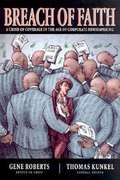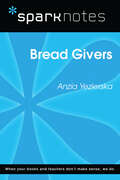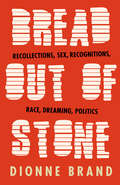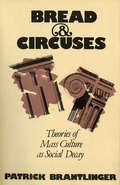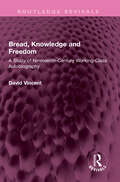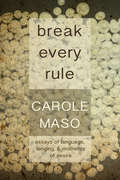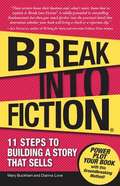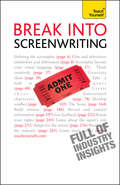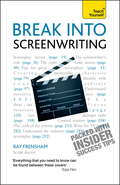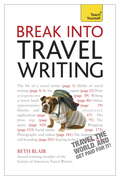- Table View
- List View
Bram Stoker, Dracula and the Victorian Gothic Stage
by Catherine WynneBram Stoker worked in the theatre for most of his adult life, as theatre reviewer in Dublin in the 1870s and as business manager at London's Royal Lyceum Theatre in the final two decades of the 19th century. Despite this, critical attention to the influence of the stage on Stoker's writing has been sparse. Bram Stoker, Dracula and the Victorian Gothic Stage addresses this lacuna, examining how Stoker's fictions respond to and engage with Victorian theatre's melodramatic climate and, in particular, to supernatural plays, Gothic melodramas and Shakespearean productions that Henry Irving and Ellen Terry performed at the Lyceum. Bram Stoker, Dracula and the Victorian Gothic Stage locates the writer between stage and page. It reconsiders his literary relationships with key actors, and challenges the biographical assumption that Henry Irving provided the model for the figure of Count Dracula.
Branded Outlaw
by L. Ron HubbardSaddle up for a riveting tale of the Old West! When Lee Weston's father writes him that an old enemy, Harvey Dodge, is back in town, Lee rides out in a hurry from Wyoming to Pecos, New Mexico only to find his father murdered and the family ranch burned to the ground. Certain that Dodge is to blame, Lee sets off to settle the score but gets into a fiery Colt showdown in the town of Pecos. Severely wounded, he flees into the mountains just before passing out. As fate would have it, Dodge's beautiful, yet headstrong, daughter, Ellen, finds Lee's unconscious body and secretly nurses him back to health. But when Lee insists on continuing his plan for revenge, he gets himself into a heap more trouble--false accusations, a near lynching at the hands of an angry mob and the scorn of the only girl he ever looked at more than once! "...the flair of Louis L'Amour or Zane Grey." --True West
Branding Oscar Wilde (Routledge Studies in Nineteenth Century Literature)
by Michael Patrick GillespieBranding Oscar Wilde traces the development and perception of Wilde’s public persona and examines the impact of interpretations of his writing. Through calculated behavior, provocative language, and arresting dress, Wilde self-consciously created a brand initially recognized by family and friends, then by the British public, and ultimately by large audiences over the world. That brand changed over the course of his public career—both in the way Wilde projected it and in the way it was perceived. Comprehending the fundamental elements of the Wilde brand and following its evolution are integral to a full understanding of his art. The study focuses on how branding established important assumptions about Wilde and his work in his own mind and in those of his readers, and it examines how each stage of brand development affected the immediate responses to Wilde’s writings and, as it continued to evolve, progressively shaped our understanding of the Wilde canon.
Branding TV: Principles and Practices
by Walter McDowell Alan BattenIn an effort to halt increasing media competition and decreasing audience shares, Branding has become the new mantra among television station and network executives. Branding TV: Principles and Practices second edition goes beyond the jargon of branding to explain the essential principles underlying successful branding and offers many practical strategies to measure, build and manage television brand equity. For instructional purposes, the book pays particular attention to the local commercial TV station and its news franchise. Written by broadcast professionals with years of experience, this book shows how the notions of branding are no more prevalent than in the battle for dominance in local news. The practical suggestions in the book will help the savvy manager understand and take advantage of branding in their efforts to move their property to the forefront in the marketplace.
Brands: Interdisciplinary Perspectives (Routledge Interpretive Marketing Research)
by Jonathan E. SchroederBranding has emerged as a cornerstone of marketing practice and corporate strategy, as well as a central cultural practice. In this book, Jonathan Schroeder brings together a curated selection of the most influential and thought-provoking papers on brands and branding from Consumption Markets and Culture, accompanied by new contributions from leading brand scholars Giana Eckhardt, John F. Sherry, Jr., Sidney Levy and Morris Holbrook. Organised into four perspectives – cultural, corporate, consumer, critical - these papers are chosen to highlight the complexities of contemporary branding through leading consumer brands such as Disney, eBay, Guinness, McDonalds, Nike, and Starbucks. They address key topics such as celebrity branding, corporate branding, place branding, and retail branding and critique the complexities of contemporary brands to provide a rich trove of interdisciplinary research insights into the function of brands as ethical, ideological and political objects. This thought-provoking collection will be of interest to all scholars of marketing, consumer behaviour, anthropology and sociology, and anyone interested in the powerful roles brands play in consumer’s lives and cultural discourse.
Braudel Revisited
by Geoffrey Symcox Gabriel Piterberg Teofilo RuizFernand Braudel (1912-1985), was a leading French historian and author of, among other books, the groundbreaking The Mediterranean and the Mediterranean World in the Age of Philip II (1949). One of the founders of the Annales School in France, Braudel insisted on treating the Mediterranean region as a whole, irrespective of religious and national divides. Braudel's new historiography rejected political history as the dominant discipline and espoused a 'total history' or a 'history from below' that would tell the story of the vast majority of humanity hitherto excluded from the grand narrative. At the time of the book's appearance, this premise was revolutionary.The contributors to Braudel Revisited assess the impact of Braudel's work on today's academic world, in light of subsequent methodological shifts. Engaging with Braudel's texts as well as with his ideas, the essays in this volume speak to the enduring legacy of his work on the ongoing exploration of early modern history.
Brave New World (MAXNotes Literature Guides)
by Sharon YunkerREA's MAXnotes for Aldous Huxley's Brave New World MAXnotes offer a fresh look at masterpieces of literature, presented in a lively and interesting fashion. Written by literary experts who currently teach the subject, MAXnotes will enhance your understanding and enjoyment of the work. MAXnotes are designed to stimulate independent thought about the literary work by raising various issues and thought-provoking ideas and questions. MAXnotes cover the essentials of what one should know about each work, including an overall summary, character lists, an explanation and discussion of the plot, the work's historical context, illustrations to convey the mood of the work, and a biography of the author. Each chapter is individually summarized and analyzed, and has study questions and answers.
Brave New World Revisited
by Aldous HuxleyIn this &“brilliantly written&” book, the author of Brave New World reflects on his dystopian classic—and its echoes in the real world decades later (Kirkus Reviews). Written almost thirty years after the publication of Aldous Huxley&’s groundbreaking dystopian novel, Brave New World Revisited compares the &“future&” of 1958 with his vision of it from the early 1930s. Touching on subjects as diverse as world population, drugs, subliminal suggestion, and totalitarianism, these timeless essays provide a fascinating look at ideas of early science fiction in the context of the real world. &“It is a frightening experience, indeed, to discover how much of his satirical prediction of a distant future became reality in so short a time. . . . fascinating.&” —The New York Times Book Review
Brave New World SparkNotes Literature Guide (SparkNotes Literature Guide Series #19)
by SparkNotesBrave New World SparkNotes Literature Guide by Aldous Huxley Making the reading experience fun! When a paper is due, and dreaded exams loom, here's the lit-crit help students need to succeed! SparkNotes Literature Guides make studying smarter, better, and faster. They provide chapter-by-chapter analysis; explanations of key themes, motifs, and symbols; a review quiz; and essay topics. Lively and accessible, SparkNotes is perfect for late-night studying and paper writing. Includes:An A+ Essay—an actual literary essay written about the Spark-ed book—to show students how a paper should be written.16 pages devoted to writing a literary essay including: a glossary of literary termsStep-by-step tutoring on how to write a literary essayA feature on how not to plagiarize
Brave Taco (Fountas & Pinnell LLI Green #Level E, Lesson 80)
by Charlot WilsonFountas and Pinnell Leveled Literacy Intervention Green System -- 1st Grade
Brave the Page
by National Novel Writing MonthThe official NaNoWriMo handbook that inspires young people to tackle audacious goals and complete their creative projects.Partly a how-to guide on the nitty-gritty of writing, partly a collection of inspiration to set (and meet) ambitious goals, Brave the Page is the go-to resource for middle-grade writers. Narrated in a fun, refreshingly kid-friendly voice, it champions NaNoWriMo's central mission that everyone's stories deserve to be told. The volume includes chapters on character, plot, setting, and the like; motivating essays from popular authors; advice on how to commit to your goals; a detailed plan for writing a novel or story in a month; and more!National Novel Writing Month (NaNoWriMo) is a 501(c)(3) nonprofit that believes in the transformational power of creativity. They provide the structure, community, and encouragement to help people find their voices, achieve creative goals, and build new worlds--on and off the page. With its first event in 1999, the organization's programs now include National Novel Writing Month in November, Camp NaNoWriMo, the Young Writers Program, Come Write In, and the "Now What?" Months.
Braving the Fire: A Guide to Writing About Grief and Loss
by Jessica HandlerBraving the Fire is the first book to provide a road map for the journey of writing honestly about mourning, grief and loss. Created specifically by and for the writer who has experienced illness, loss, or the death of a loved one, Braving the Fire takes the writers' perspective in exploring the challenges and rewards for the writer who has chosen, with courage and candor, to be the memory keeper. It will be useful to the memoirist just starting out, as well as those already in the throes of coming to terms with complicated emotions and the challenges of shaping a compelling, coherent true story.Loosely organized around the familiar Kübler-Ross model of Five Stages of Grief, Braving the Fire uses these stages to help the reader and writer though the emotional healing and writing tasks before them, incorporating interviews and excerpts from other treasured writers who've done the same. Insightful contributions from Nick Flynn, Darin Strauss, Kathryn Rhett, Natasha Trethewey, and Neil White, among others, are skillfully bended with Handler's own approaches to facing grief a second time to be able to write about it. Each section also includes advice and wisdom from leading doctors and therapists about the physical experience of grieving. Handler is a compassionate guide who has braved the fire herself, and delivers practical and inspirational direction throughout.
Brazil Under Construction
by Sophia BealBrazil under Construction tracks how Brazil's major public works projects and the fiction surrounding them mark a twofold construction of the nation: the functional construction of the country's public infrastructure and the symbolic construction of nationhood.
Brazil, Lyric, and the Americas
by Charles A. Perrone"This is Perrone at his most brilliant. Erudite but accessible, thorough but playful: Brazil, Lyric, and the Americas is the latest contribution by the most knowledgeable U.S.-based scholar of the Brazilian lyric."--Severino Joao Albuquerque, University of Wisconsin "Perrone retraces the dialogue of the Brazilian lyric with the poetry of the Americas in the generous spirit that the poets' utopia of solidarity will serve as a counterpoint to the harsher side of globalization."--Luiza Moreira, Binghamton University In this highly original volume, Charles Perrone explores how recent Brazilian lyric engages with its counterparts throughout the Western Hemisphere in an increasingly globalized world. This pioneering, tour-de-force study focuses on the years from 1985 to the present and examines poetic output--from song and visual poetry to discursive verse--across a range of media. At the core of Perrone's work are in-depth examinations of five phenomena: the use of the English language and the reception of American poetry in Brazil; representations and engagements with U.S. culture, especially with respect to film and popular music; epic poems of hemispheric solidarity; contemporary dialogues between Brazilian and Spanish American poets; and the innovative musical, lyrical, and commercially successful work that evolved from the 1960s movement Tropicalia.
Brazilians Working With Americans/Brasileiros que trabalham com americanos: Cultural Case Studies/Estudos de casos culturais
by Kelm Orlando R. Risner Mary E.Brazilians Working With Americans presents ten short case studies that effectively illustrate many of the cultural factors that come into play when North American business professionals work in Brazil. The authors summarize each case and the aspects of culture it involves, and American and Brazilian executives comment on the cultural differences highlighted by that case. A list of topics and questions for discussion also help draw out the lessons of each business situation. To make the book equally useful to Brazilians and Americans (whether businesspeople or language students), the entire text is presented in both English and Portuguese.
Breach of Faith: A Crisis of Coverage in the Age of Corporate Newspapering
by Gene Roberts Thomas KunkelEnormous changes have taken place in the newspaper industry in recent years, from the birth of USA Today to the growth of Web-based media, introducing a host of questions about these changes' impact on average American newspapers in particular and on democracy as a whole. Newspaper editor Roberts (New York Times; Philadelphia Inquirer) and a group of journalists have been studying these questions and have released their findings in a pair of volumes. The first, Leaving Readers Behind (2001), focused on the economics of these changes. This second volume focuses on these changes' impact on the content of daily papers. While these eight essays touch on a variety of concerns-declining coverage of statehouse politics even as lobbyists grab more power, increasing coverage of business and sports, and the decrease of national and international coverage-there's an underlying despair that runs throughout them. Modern newspapers are better written and better looking, but they've lost their distinctive flavor, these writers say, that "essential local ingredient" that makes readers loyal. Worse, they avoid important national and most international stories; "a foreign story that doesn't involve bombs, natural disasters, or financial calamity" rarely makes it into the news. Focus group researchers argue that this trend mirrors readers' preferences, yet many of these essays insist that to maintain an informed electorate, newspapers need to refocus on hard news and let the accountants worry about the bottom line. J-school students and media policy makers will benefit greatly from this wise collection. Copyright 2002 Reed Business Information, Inc. -- From Publishers Weekly
Bread Givers (SparkNotes Literature Guide Series)
by SparkNotesBread Givers (SparkNotes Literature Guide) by Anzia Yezierska Making the reading experience fun! Created by Harvard students for students everywhere, SparkNotes is a new breed of study guide: smarter, better, faster.Geared to what today's students need to know, SparkNotes provides:chapter-by-chapter analysis explanations of key themes, motifs, and symbols a review quiz and essay topicsLively and accessible, these guides are perfect for late-night studying and writing papers.
Bread Out of Stone: Recollections on Sex, Recognitions, Race, Dreaming and Politics
by Dionne Brandessays, social criticism on race, sex, class
Bread and Circuses: Theories of Mass Culture As Social Decay
by Patrick BrantlingerLively and well written, Bread and Circuses analyzes theories that have treated mass culture as either a symptom or a cause of social decadence. Discussing many of the most influential and representative theories of mass culture, it ranges widely from Greek and Roman origins, through Marx, Nietzsche, Freud, Ortega y Gasset, T. S. Eliot, and the theorists of the Frankfurt Institute, down to Marshall McLuhan and Daniel Bell, Brantlinger considers the many versions of negative classicism and shows how the belief in the historical inevitability of social decay—a belief today perpetuated by the mass media themselves—has become the dominant view of mass culture in our time. While not defending mass culture in its present form, Brantlinger argues that the view of culture implicit in negative classicism obscures the question of how the media can best be used to help achieve freedom and enlightenment on a truly democratic basis.
Bread, Knowledge and Freedom: A Study of Nineteenth-Century Working Class Autobiography (Routledge Revivals)
by David VincentFirst published in 1981, Bread, Knowledge and Freedom is a study of 142 working class autobiographies all of which cover some part of the period between 1790 and 1850. It is a full-scale examination of a form of source material that is significantly extensive. The book illustrates many aspects of ordinary working-class family life as well as the working-class pursuit of knowledge and literacy and the attempts of the middle-class educators to impose their notion of ‘useful knowledge.’ Dr. Vincent concludes with an assessment of the contribution of autobiography to nineteenth century working class history. This book will be of interest to students of history, sociology and literature.
Break Every Rule
by Carole MasoIn this groundbreaking work of ecstatic criticism, Carole Maso shows why she has risen, over the past fifteen years, as one of the brightest stars in the literary firmament. Ever refusing to be marginalized or categorized by genre, Maso is an incisive, compassionate writer who deems herself "daughter" of William Carlos Williams, a pioneer in combining poetry and fiction with criticism, journalism, and the visual arts. She is "daughter," too, of Allen Ginsberg, who also came from Paterson, New Jersey. Known for her audacity, whether exploring language and memory or the development of the artistic soul, Maso here gives us a form-challenging collection, intelligent, and persuasive
Break Into Fiction
by Dianna Love Mary BuckhamGetting a book published is hard enough-getting a novel published is doubly so! But a writer seeing his story on bookshelves everywhere is just a rewrite away with this book! Written by two award-winning novelists, this workshop-in-a-book is all aspiring authors need to master the art of fiction-and see their novel in print. Based on their popular workshops, Mary Buckham and Dianna Love Snell have created a novel-writing system that anyone can follow. Their innovative method shows writers how to create stories of depth, excitement, and emotion with: Easy-to-understand templates that guide the new writer through building a novel and show more experienced writers how to deepen a plot and take a first draft to the next level Reference examples from a strongly-plotted popular genre films like suspense, classics, children, and romance Simple worksheets to build a strong story one plot point at a time for any genreTroubleshooting tips that reveal how to find and fix holes that weaken the plot Insights from best-selling novelists representing a variety of fiction genres A bonus dialogue guide that reveals how to make a character come alive through conversation. Inspiring authors shall struggle no more with the help of this step-by-step guide!
Break Into Screenwriting: Your complete guide to writing for stage, screen or radio
by Ray FrenshamThis is a comprehensive, jargon-free guide for all budding screenwriters. Its aim is not just to guide you through the techniques and skills you need to write for the screen (film and television), but also to give you guidance on how to approach the industry as a whole. Focusing on every aspect of screenwriting, from how to set about the writing process to how to develop your characters, plot and structure, this book will give you all the guidance you need to break into this highly competitive industry and make a career for yourself as a screenwriter.NOT GOT MUCH TIME?One, five and ten-minute introductions to key principles to get you started.AUTHOR INSIGHTSLots of instant help with common problems and quick tips for success, based on the author's many years of experience.TEST YOURSELFTests in the book and online to keep track of your progress.EXTEND YOUR KNOWLEDGEExtra online articles at www.teachyourself.com to give you a richer understanding of screenwriting.FIVE THINGS TO REMEMBERQuick refreshers to help you remember the key facts.TRY THISInnovative exercises illustrate what you've learnt and how to use it.
Break Into Screenwriting: Your complete guide to writing for stage, screen or radio
by Ray FrenshamThis is a comprehensive, jargon-free guide for all budding screenwriters. Its aim is not just to guide you through the techniques and skills you need to write for the screen (film and television), but also to give you guidance on how to approach the industry as a whole. Focusing on every aspect of screenwriting, from how to set about the writing process to how to develop your characters, plot and structure, this book will give you all the guidance you need to break into this highly competitive industry and make a career for yourself as a screenwriter.
Break Into Travel Writing: How to write engaging and vivid travel writing and journalism
by Beth BlairGetting paid to go on holiday may sound like a great lifestyle. But there's a lot of hard graft involved - particularly, breaking into this industry in the first place. Few industries have changed as rapidly as publishing, and within publishing few areas have changed as rapidly as travel publishing. This book will bring you bang up-to-date with the latest trends in blogging, social media, magazines, websites, travel guides, and travel books. It provides specific advice for each sector, on how to write and, just as importantly, how to get published. Written by Beth Blair, an American travel writer who has been published in books, magazines, and online, this book is full of practical and inspiring advice that will help you broaden your horizons and turn your travel writing into cash.
